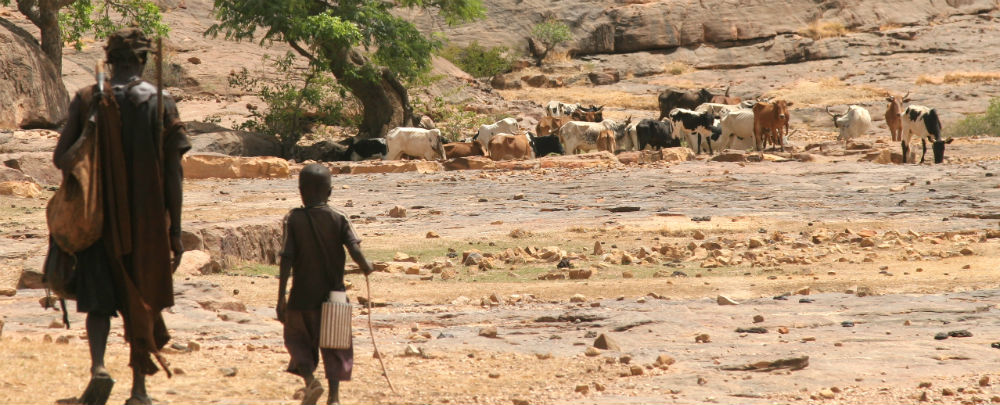
A Dogon cattle herder with his son in Mali. (Photo: Ferdinand Reus)
Lieutenant Colonel Alou Boi Diarra, a senior officer from Mali received four distinctions from the National Defense University College of International Security Affairs for his thesis, “Armed Nation Building: Disbanding Ethnic Militias and Ending Farmer-Herder Violence in Central Mali.” He was recognized as a Distinguished Graduate and won the Honor Thesis Award, Outstanding International Fellow Award, and Brigadier General Shakoor Award.
Hailing from Kati, in Mali’s Koulikoro region, Diarra has served in the Malian military since 2000. His thesis examines the problem of farmer-herder violence in the Sahel, specifically focusing on central Mali. He notes, “The persistence and escalation of the problem of farmer/herder violence in my country is also linked to the government’s national security approach, which is narrowly focused on the protection of the state, resulting in the inability to protect large parts of the population.”
The study and its findings are especially pertinent to current tensions in Mali and its neighboring countries. Since 2014, Fulani herder communities have fought Bambara and Dogon farmer populations in Central Mali. Between 2016 and 2018, more than 1,200 people and 30,000 more have been displaced. In the first 3 months of 2019 alone, over 440 civilians and 150 soldiers died, including the March 23, 2019 massacre when suspected Dogon militiamen killed over 160 Fulani villagers in Ogossagou.
These communities have raised self-defense militias to protect their access to water, land, and other natural resources that are rapidly dwindling due to climate change, Diarra’s study found. The conflict is also fueled by widespread violence in northern and central Mali, where al Qaeda–linked jihadist insurgents are concentrated.
A viable solution for Mali’s government, and for other countries faced with similar issues such as Nigeria and Burkina Faso, is “a paradigm shift from state security to inclusive human security,” according to Diarra. He recommended five elements to this new approach.
- First, it requires a whole-of-government strategy that combines civilian, military, law enforcement, and civil protection.
- Second, “people-centered counterinsurgency” efforts that go beyond military reform to include “nation-building” (i.e., restoring a view of national cohesion and a sense of belonging within Malian society) is required to address local grievances.
- Third, the government should focus on restoring its legitimacy and the rule of law, as the violence not only undermines social cohesion but also challenges the very existence of the Malian state. Diarra notes that legitimacy can be strengthened “by bringing hope, security, and dignity and by leveraging customary mechanisms under the auspices of effective rule of law.”
- Fourth, a development plan is urgently needed to address the underlying social and economic grievances that shape Mali’s complex environment of climate change, resource scarcity, and jihadist insurgency.
- Finally, the international community has a role to play in supporting this human security approach and working with the Malian government to implement it.
“African countries still need to find a way to develop features of a modern state without undermining the specificity of African civilizations or risking alienating large sections of their populations,” Diarra concludes. “Finding inclusive, innovative solutions to pastoral instability is not only a challenge but also an opportunity that could definitively launch African nations into the 21st century.”
Additional Resources
- Pauline Le Roux, “Exploiting Borders in the Sahel: The Islamic State in the Greater Sahara,” Spotlight, Africa Center for Strategic Studies, June 10, 2019.
- Africa Center for Strategic Studies, “A Review of Major Regional Security Efforts in the Sahel,” Infographic, March 4, 2019.
- Pauline Le Roux, “Confronting Central Mali’s Extremist Threat,” Spotlight, Africa Center for Strategic Studies, February 22, 2019.
- Africa Center for Strategic Studies, “The Complex and Growing Threat of Militant Islamist Groups in the Sahel,” Infographic, February 15, 2019.
More on: Identity Conflict Sahel Security Trends Sahel

